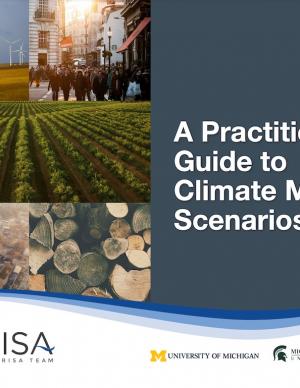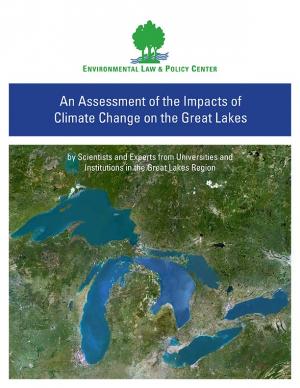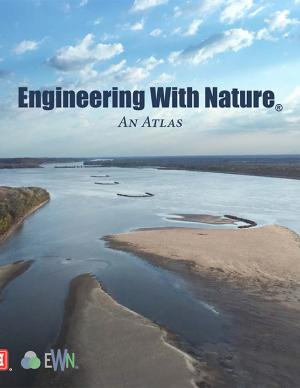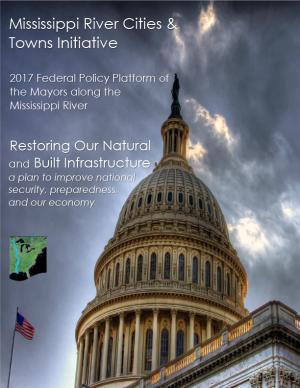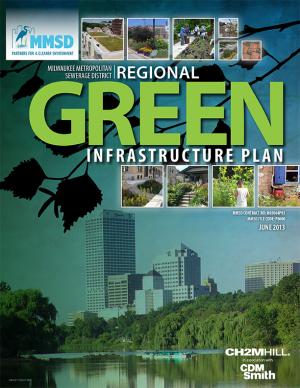Access a range of climate-related reports issued by government agencies and scientific organizations. Browse the reports listed below, or filter by scope, content, or focus in the boxes above. To expand your results, click the Clear Filters link.
This Guide is written for practitioners already using or wanting to use future climate information in their work, but who are not familiar with the underlying assumptions and choices surrounding climate data. Here, we introduce the climate model scenarios that are used to “drive” climate models forward in time. These scenarios are a combination of socioeconomic and climate forcing pathways. We summarize differences between these scenarios for the Great Lakes region to show users how their choice of model scenario affects future temperature and precipitation projections.
Created especially for decision makers and adaptation planners in the Great Lakes region, this report offers planners guidance in developing adaptation plans while navigating local politics and specialized data. Content is accessible for users of all skill levels, with a focus on beginner. The report is divided into six main sections: Climate Change in the Great Lakes Region, Decision Making Under Uncertainty, Climate Information in the Local Planning Process, Data Analysis Guide for Assessing Climate Vulnerability, Building Climate Knowledge and Capacity, and Making the Case.
Climate change is causing significant and far-reaching impacts on the Great Lakes and the Great Lakes region. This report, from 18 leading scientists and experts from Midwest and Canadian universities and research institutions, draws on the array of existing research to assess how the shifting global climate impacts the unique Great Lakes region.
The EWN Atlas is a collection of 56 projects illustrating a diverse portfolio of contexts, motivations, and successful outcomes, presented and considered from an Engineering With Nature® perspective to reveal the usefulness of nature-based approaches and the range of benefits that can be achieved. Engineering With Nature is an initiative of the U.S. Army Corps of Engineers enabling more sustainable delivery of economic, social, and environmental benefits associated with water resources infrastructure. EWN intentionally aligns natural and engineering processes to efficiently and sustainably deliver economic, environmental, and social benefits through collaborative processes.
This plan sets forth the 2017 federal policy platform of the Mississippi River Cities and Towns Initiative, an association of 75 U.S. mayors along the Mississippi River. The document sets forth the mayors’ recommendation of federal programs to support and strengthen the built and natural infrastructure of the Mississippi River corridor, proposing specific funding levels and support of several federal programs. Suggestions for finance mechanisms to restore Mississippi River infrastructure are also included.
The Dane County Climate Change Action Council was formed in March 2013 with a mission to ensure that Dane County government was better prepared for weather extremes brought on by global climate change. The Council facilitated an internal review of county preparations and potential modifications to the operations and capital investments of the county, resulting in this report identifying Dane County’s potential vulnerabilities to weather extremes associated with global climate change and strategies to adapt to a changing climate. The report is the first step in the county’s effort to improve the resiliency of its climate-sensitive resources in the face of climate change; future steps will include cross-departmental collaborations to implement the adaptation strategies outlined in the report.
The Milwaukee Metropolitan Sewerage District created a systematic plan to implement widespread green infrastructure. As a regional agency, the District is uniquely positioned to lead green infrastructure planning for the Milwaukee region and has funding to undertake the work. This effort will help the District make logical green infrastructure funding decisions, will help municipalities and non-governmental organizations prioritize their actions, and will help inform municipalities and private funders where their green infrastructure money can do the greatest good. Technical analyses for the region’s impervious surfaces, costs/benefits, and recommendations were all completed; the report comprises the final Regional Green Infrastructure Plan. The plan was approved by the MMSD Commission on July 22, 2013.

